|
|
|
Sort Order |
|
|
|
Items / Page
|
|
|
|
|
|
|
| Srl | Item |
| 1 |
ID:
168366
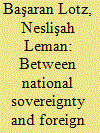

|
|
|
|
|
| Summary/Abstract |
This article examines how the economic concessions given to foreign companies during the Ottoman Empire were assumed by the new Turkish Republic and readjusted under the new circumstances that arose after the First World War. Using mainly the documents of the French diplomatic archives and of the Turkish state, the article focuses on the negotiations between the Turkish government in Ankara and the representatives of the French companies, in the summer of 1923. Taking into account the nationalist ideas of the new Turkish government, the European governments and companies were concerned about the economic path that young Turkey would follow and they were worried about their economic interests in this country. The article puts forward that the rigorous attitude of the Turkish government regarding national sovereignty and political independence was a determining factor in these first years of the new regime but did not constitute an obstacle to the privileges of the foreign capital in Turkey.
|
|
|
|
|
|
|
|
|
|
|
|
|
|
|
|
| 2 |
ID:
168365
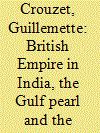

|
|
|
|
|
| Summary/Abstract |
Genealogies of the term ‘Middle East’ conventionally focus on a juncture around the 1890s, when it gained new geopolitical currency, promoted by various European and American officials with reference to a space centred around the Arabo-Persian Gulf. This article argues instead that the ‘Middle East’ label should be seen as the culmination of a longer process, led less from London than from India. Over the previous century, this consolidation of ‘British’ India as a distinct regional actor was accompanied by the conceptualisation of its borderlands, including that Gulf-centred space. This space become a theatre for economic and political monitoring strategised from India, seeking to transform what was represented as a pirate-infested margin into a pacified buffer zone. Control and exploitation of pearl fisheries, the main economic activity for Gulf populations, was central to these efforts. Imperial strategy around the Gulf pearl was a key tool in founding an informal Indian empire in the Gulf and its hinterlands, in that very space to which the name ‘Middle East’ would subsequently be given.
|
|
|
|
|
|
|
|
|
|
|
|
|
|
|
|
| 3 |
ID:
168371


|
|
|
|
|
| Summary/Abstract |
Greater Syria experienced several civil wars in the nineteenth and twentieth centuries affecting women and children, the most vulnerable segments of the population whose history is rarely told. This article deals with Syrian children orphaned as a result of the 1860 Civil War in Mount Lebanon and Damascus and from other parts of Ottoman Palestine who were brought to the Syrian orphanage in Jerusalem founded by the German Protestant missionary Johann Ludwig Schneller. His annual reports (1861–3) provide much needed data on the emotional and physical condition of orphans from agrarian regions in Greater Syria and contribute to a better understanding of the historiography of childhood in the region.
|
|
|
|
|
|
|
|
|
|
|
|
|
|
|
|
| 4 |
ID:
168370
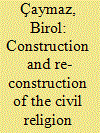

|
|
|
|
|
| Summary/Abstract |
The longest living among its twentieth-century counterparts, the century-old cult of Atatürk is deeply rooted in the collective conscience in Turkey. In this essay, we will try to show the dual role of the image of Atatürk in the political struggle, both in current times and in the past, as a national hero created around civil religiosity. In the case of Atatürk, not only do we encounter a figure that primarily facilitates the legitimation of the existing political and social system, but also an eternal saviour who is called upon in order to oppose that system at various times.
|
|
|
|
|
|
|
|
|
|
|
|
|
|
|
|
| 5 |
ID:
168373
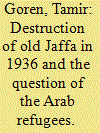

|
|
|
|
|
| Summary/Abstract |
One outcome of the Jewish–Arab conflict at the time of the British Mandate was the Arab refugee problem. It usually accompanied any escalation in hostilities and was evident at foci of the friction between Arabs and Jews. Reprisals by the authorities against the Arab population was an additional cause. At the time of the Arab Revolt the refugee issue assumed for the first time significant proportions as a result of destructive actions by the British army, the greatest being the home demolition operations unleashed in Jaffa. As a result many families became refugees inside and outside their city. For the first time in the Mandate period the British government was obliged to contend with the problem of Arab refugees that it itself had created, and resolve it. The article aims to shed light on a unique operation by the Mandatory government intended to establish a locality to house Arab refugees, which was implemented and completed in the Mandate period. The article shows that for the authorities the establishment of a quarter for refugees was the required and most appropriate solution to the problem that had arisen.
|
|
|
|
|
|
|
|
|
|
|
|
|
|
|
|
| 6 |
ID:
168372


|
|
|
|
|
| Summary/Abstract |
The city of Ashkelon occupies the geographical area that, during the Ottoman and Mandatory periods, belonged to six settlements (Majdal, Hamame, Nailia, Jora, Rasem, and Hasas). Although these settlements differed from one another in nature and in status, they nonetheless had ties with each other and with the large village, later to become the town Majdal, the central settlement in the region. The various developments that Palestine underwent during the course of the nineteenth and twentieth centuries did not pass over this area. Although the livelihood of the settlements in the region was based primarily on agriculture, each also possessed a distinctive character. The research describes the geographical developments in the Ashkelon region and its landscape, and examines the changes they and the area, underwent as a case study of the southern coastal plain.
|
|
|
|
|
|
|
|
|
|
|
|
|
|
|
|
| 7 |
ID:
168375


|
|
|
|
|
| Summary/Abstract |
The article discusses the status of the Room of the Last Supper and King David's tomb – the two central holy sites located on Mount Zion, south of the old city of Jerusalem – in the period between 1948 and 1967. The purpose of the article is to examine the way the State of Israel treated those sites: a Jewish holy site and a Christian holy site located one above the other. The status of these holy sites during this period has wider implications for the broader picture of the Jewish and Christian holy sites developed and controlled by Israel during these years. It raises questions about the Israeli attitude towards Christian holy sites in Israel in general and in Western Jerusalem in particular.
|
|
|
|
|
|
|
|
|
|
|
|
|
|
|
|
| 8 |
ID:
168369
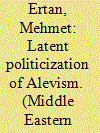

|
|
|
|
|
| Summary/Abstract |
Traditional Alevism, which was based on rural/isolated life started to dissolve as a result of urbanization in the 1960s and the 1970s. The social dynamics of Turkey associated the dissolution of archaic Alevism with political mobilization that Turkey experienced in the same period; therefore, the Alevis affiliated themselves with socialist movements in order to participate into political process more efficiently. This article analyses the affiliation between Alevis and socialist movements within the framework of the overlap between the socio-political culture of the Alevis and the political needs of the socialist movements in the 1960s and the 1970s. This affiliation might be followed in Alevi folk songs, squatter settlements, villages and the massacres that Alevis suffered in the late 1970s. Because the relation between the Alevis and socialist movements meant not the politicization of the Alevism as an independent politics of identity, but rather the politicization of Alevis through their affiliation with leftist politics, this article conceptualizes the politicization dynamism of the Alevism between 1960 and 1980 as latent politicization.
|
|
|
|
|
|
|
|
|
|
|
|
|
|
|
|
| 9 |
ID:
168374
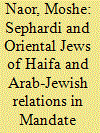

|
|
|
|
|
| Summary/Abstract |
This article examines the development of the relations between Jews and Arabs in Haifa during the British Mandate period from the perspective of the Sephardi and Oriental Jews (Mizrahim). It focuses on the two Sephardi neighborhoods in Haifa: Ard al-Yahud and Harat al-Yahud. The article examines the character of the shared Jewish-Arab space that existed in both these mixed neighborhoods, which were inhabited by both Jews and Arabs. The character of this spatial system was exposed during the course of a local political struggle to secure representation for the Sephardi and Oriental Jews and to improve their social condition, as well as during periods of security tension. The article also examines the attitude of the Sephardi leadership toward the ‘Arab question’, and discusses the manner in which everyday life in Ard al-Yahud and Harat al-Yahud manifested the existence of an Arab-Jewish identity during the Mandate period.
|
|
|
|
|
|
|
|
|
|
|
|
|
|
|
|
| 10 |
ID:
168368


|
|
|
|
|
| Summary/Abstract |
This article tries to shed light on Turco-British relations in the early Cold War era. It focuses on the two states’ cooperation in Middle Eastern defence, as well as their interactions with Egypt and Greece. Immediately after the Second World War, the Soviet Union and communism were accepted as common threats directed against Turkey, Greece, Britain, the entire Western camp and a broad range of Middle Eastern countries. Washington and London were in search of alliances with regional actors; however, due to the anti-Western attitudes of Egypt in particular, and the anti-Israeli attitudes of the Arabic realm in general, the West was not satisfied with the defence system established in the region. In regard to the relations between the four abovementioned states, while Turkey and Britain joined forces against the Egyptian cause in the Suez issue and the Greek cause on the Cyprus issue, Greece and Egypt sided with each other against the British positions.
|
|
|
|
|
|
|
|
|
|
|
|
|
|
|
|
| 11 |
ID:
168367
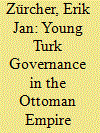

|
|
|
|
|
| Summary/Abstract |
The article analyses the system of government of the Ottoman Empire during the First World War by looking at three elements: the constitutional-parliamentarian monarchy, the Committee of Union and Progress and the army. The analysis takes place along two axes: one in which the functioning of, and the power relations between, the different institutional elements are analysed, and one based on a series of case studies of important decision-making moments of the years 1914–18.
The civil-military relations as they developed during the war years are studies in a comparative framework. The Ottoman situation is analysed against the backdrop of changes in the balance of power between military and civilian authorities in other belligerent countries in Europe.
|
|
|
|
|
|
|
|
|
|
|
|
|
|
|
|
|
|
|
|
|